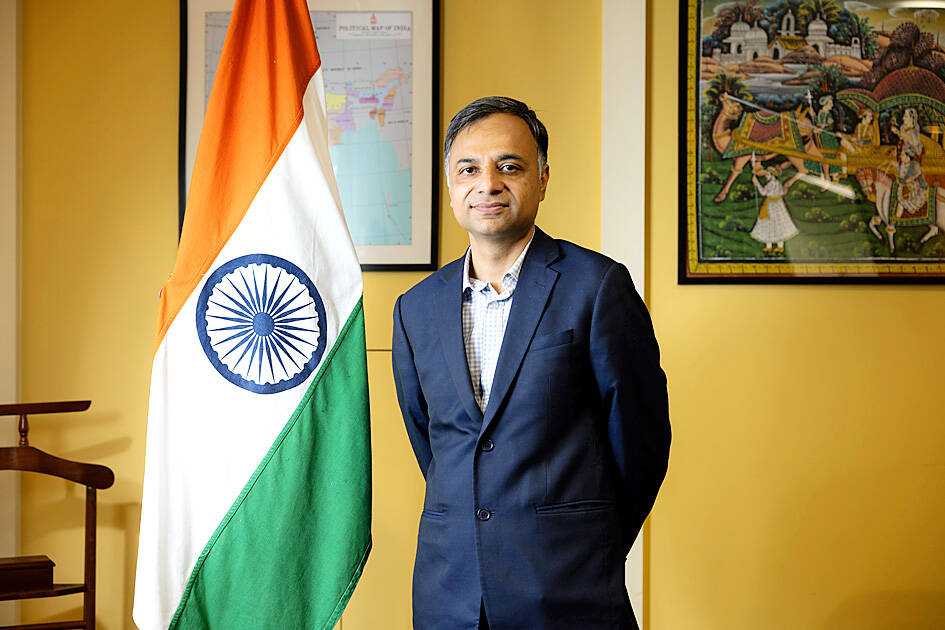India’s new representative to Taiwan said he hopes the two sides’ complementary strengths, and shared values and interests would provide a solid foundation for deepening ties and cooperation for years to come.
“The place [Taiwan] is extremely open. It’s free, pluralistic and it has great respect for other cultures,” India Taipei Association (ITA) Director-General Manharsinh Laxmanbhai Yadav, who took office in August, said in an interview late last month.
Taiwan and India have both prioritized smart solutions and manufacturing, digital and green transformation, as well as the cultivation of a talented workforce, Yadav said, adding that the nations share “a similar vision for the future.”

Photo: CNA
The two sides also have complementary strengths, he said, pointing to Taiwan’s leading role in hardware manufacturing, especially semiconductors, and India’s robust software sector, which provides high-quality information technology services worldwide.
Taiwan has a need for skilled workers, and India has a young and talented workforce, and is an international hub for engineers, he said.
These factors make India and Taiwan “natural partners,” he said, adding that Taiwan’s high-tech companies, including chipmakers, should invest in India, which produces more than 1 million engineers a year.
It is also the right time for the semiconductor industry to consider expanding to India because as the world’s fifth-largest economy, it offers an ample market for semiconductor goods, he said.
Another area for closer cooperation is space, particularly after India became only the fourth country to complete an intact landing on the moon last month, after the US, the Soviet Union and China, he said.
India has a “market-friendly” space program that has already helped several countries successfully launch satellites, Yadav said.
“I see a good area for cooperation between the Indian private sector and Taiwanese private sector in building satellites,” he said.
Regarding Taiwan’s new office planned for Mumbai, the representative called the decision a “very good move.”
He said that putting a Taipei office in the financial capital of India would help the countries boost bilateral economic, people-to-people and cultural exchanges.
The Ministry of Foreign Affairs has said that it hopes to open the office, its third in India after those in New Delhi and Chennai, later this year.

The Coast Guard Administration (CGA) and Chunghwa Telecom yesterday confirmed that an international undersea cable near Keelung Harbor had been cut by a Chinese ship, the Shunxin-39, a freighter registered in Cameroon. Chunghwa Telecom said the cable had its own backup equipment, and the incident would not affect telecommunications within Taiwan. The CGA said it dispatched a ship under its first fleet after receiving word of the incident and located the Shunxin-39 7 nautical miles (13km) north of Yehliu (野柳) at about 4:40pm on Friday. The CGA demanded that the Shunxin-39 return to seas closer to Keelung Harbor for investigation over the

National Kaohsiung University of Science and Technology (NKUST) yesterday promised it would increase oversight of use of Chinese in course materials, following a social media outcry over instances of simplified Chinese characters being used, including in a final exam. People on Threads wrote that simplified Chinese characters were used on a final exam and in a textbook for a translation course at the university, while the business card of a professor bore the words: “Taiwan Province, China.” Photographs of the exam, the textbook and the business card were posted with the comments. NKUST said that other members of the faculty did not see

The Taipei City Government yesterday said contractors organizing its New Year’s Eve celebrations would be held responsible after a jumbo screen played a Beijing-ran television channel near the event’s end. An image showing China Central Television (CCTV) Channel 3 being displayed was posted on the social media platform Threads, sparking an outcry on the Internet over Beijing’s alleged political infiltration of the municipal government. A Taipei Department of Information and Tourism spokesman said event workers had made a “grave mistake” and that the Television Broadcasts Satellite (TVBS) group had the contract to operate the screens. The city would apply contractual penalties on TVBS

A new board game set against the backdrop of armed conflict around Taiwan is to be released next month, amid renewed threats from Beijing, inviting players to participate in an imaginary Chinese invasion 20 years from now. China has ramped up military activity close to Taiwan in the past few years, including massing naval forces around the nation. The game, titled 2045, tasks players with navigating the troubles of war using colorful action cards and role-playing as characters involved in operations 10 days before a fictional Chinese invasion of Taiwan. That includes members of the armed forces, Chinese sleeper agents and pro-China politicians